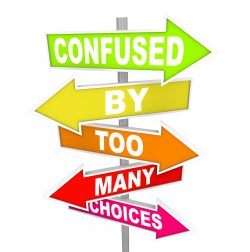Deciding How to Decide How to Make Decisions
May 7, 2018 ~ Written by: W.B. “Bud” Kirchner
My previous articles on this topic were heavily biased toward what can go wrong – essentially the pitfalls related to decision-making involving cognitive bias, thinking errors, etc.
Today, I am featuring a few ideas on how to facilitate deciding – making choices. This is an area I have written on extensively.
As a cross-section
- Thinking Errors: Part One – Is your Radar set to Detect Cognitive Traps?
- Thinking Errors: Part Three – A Field Guide to Thinking Errors
- Paradoxes To Live By
By way of further review, in my almost 20 articles on decision – I referenced mostly “big names” so today I plan to focus on a few not so (currently) high profile individuals but nevertheless offering useful ideas.
The categorization that follows is mine – intended to provide a pragmatic context. If nothing else – I trust these will get you thinking!
Finally – in the hopes of making this article ‘user friendly’ in the sense of providing ready access to still more easily accessible context on these issues I have intentionally chosen TED Talks to summarize follow-on information.
Reassemble the data the old fashioned way
“He uses statistics as a drunken man uses lamp posts – for support rather than illumination.” – Andrew Lang, Scottish writer
In his TED Talk, Sebastian Wernicke looks at the application of data analysis to predict the future and in so doing he raises two points:
- Computer/data analysis is particularly good at taking vast amounts of data apart and analyzing it.
- However, the brain remains the best tool when it comes to putting it back together again.
(Sebastian Wernicke: How to use data to make a hit TV show)
Make a decision by defining your life
“It’s not hard to make a decision when you know what your values are.” – Roy E. Disney
You start with imperfect information and no insight into how the future will play out. The underlying issue involves values – not hard facts (data). The point is if you can’t find the objective right answer because there isn’t one.
Ruth Chang of Rutgers University suggests you use the opportunity to define yourself by the decision you make “Far from being sources of agony and dread, hard choices are precious opportunities, concludes Chang”, “We become the author of our lives.”
Choose to let the “driver” make the decision
“The straight line; a respectable optical illusion, but one that ruins many a man.” – Victor Hugo, Les Miserable
While we would all instinctively opt to be in the driver’s seat and make the decision – there are situational issues related to the quality and quantity of feedback (“immediate/negative/concrete/agency”) that suggests you are better served to remain a ‘passenger’ and let someone better suited decide.
- Baba Shiv (Sometimes it’s good to give up the driver’s seat)
Make a decision as a “scout”
“Good decisions come from experience, and experience comes from bad decisions.” – Author unknown
Choosing a mindset that is less dogmatic (soldier) and more objective (scout) can improve decision quality in uncertain areas such as “curiosity”, “values” and “grounding” leads to more objective interpretation and less self-serving decisions.
- Julia Galef (Why you think you’re right — even if you’re wrong)
Choosing to decide vs. deciding to choose
“Life is the sum of all your choices.” – Albert Camus
Finally – I have chosen some information from the opposite perspective – that is to say how to facilitate decision making for others.
Sheena Lyengar touches on issues related to choices such as:
- Less is more
- Categorization
- Condition for complexity
- Concretize choices
In closing – it would be a good decision to watch these talks!
- “The Art of Choosing” – Sheena Lyengar
- “How to make choosing easier” – Sheena Lyengar
About the Author: W.B. “Bud” Kirchner is a serial entrepreneur and philanthropist with more than 50 years of business success. He is not a scientist or an academic but he does have a diversified exposure to neuroscience, psychology and related cognitive sciences. Generally speaking, the ideas he expresses here are business-angled expansions of other people’s ideas, so when possible, he will link to the original reference.



